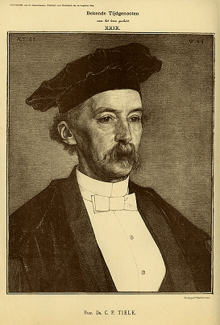Cornelis Tiele

Cornelis Petrus Tiele, (16 December 1830–11 January 1902) was a Dutch theologian and scholar.
Life
He was born at Leiden. He was educated at Amsterdam, first studying at the Athenaeum Illustre, as the communal high school of the capital was then named, and afterwards at the seminary of the Remonstrant Brotherhood. [1]
He was destined for the pastorate in his own brotherhood. After steadily declining for a considerable period, this had increased its influence in the second half of the 19th century by widening the tenets of the Dutch Methodists, which had caused many of the liberal clergy among the Lutherans and Calvinists to go over to the Remonstrants. Tiele had liberal religious views himself, which he early enunciated from the pulpit, as Remonstrant pastor of Moordrecht (1853) and at Rotterdam (1856).[1]
Upon the removal of the seminary of the brotherhood from Amsterdam to Leiden in 1873, Tiele was appointed one of its leading professors. In 1877 followed his appointment at the University of Leiden as professor of the history of religions, a chair specially created for him.[1]
With Abraham Kuenen and J. H. Scholten, amongst others, he founded the "Leiden School" of modern theology. From 1867 he assisted Kuenen, A. D. Loman and L. W. Rauwenhoff editing the Theologisch Tijdschrift.[1] In 1889 he became a member of the Teylers Eerste Genootschap.[2] In 1901, he resigned his professorship at Leiden University. He died in January 1902.
Tiele's zeal and power for work were as extraordinary as his vast knowledge of ancient languages, peoples and religions, upon which his researches, according to F. Max Müller, shed a new and vivid light.
Works
Of his many learned works, the Vergelijkende geschiedenis van de egyptische en mesopotamische Godsdiensten (1872), and the Geschiedenis van den Godsdienst (1876; new ed. 1891), have been translated into English, the former by James Ballingall (1878–1882), the latter by Joseph Estlin Carpenter (1877) under the title Outlines of the History of Religion (French translation, 1885; German translation, 1895). A French translation of the Comparative History was published in 1882.
Other works by Tiele are:
- De Godsdienst van Zarathustra, van het Ontstaan in Baktrie, tot den Val van het Oud-Perzische Rijk (1864) a work now embodied, but much enlarged and improved by the latest researches of the author, in the History of Religions (vol. ii, part ii, Amsterdam, 1901), a part which appeared only a short time before the author's death
- De Vrucht der Assyriologie voor de vergelijkende geschiedenis der Godsdiensten (1877; German ed., 1878)
- Babylonisch-assyrische Geschichte (two parts, Leipzig, 1886–1888)
- Western Asia, according to the most Recent Discoveries (London, 1894).
He was also a contributor to the Encyclopaedia Biblica, and the writer of the article "Religions" in the 9th edition of the Encyclopædia Britannica (1875).
A volume of Tiele's sermons appeared in 1865, and a collection of his poems in 1863. He also edited (1868) the poems of Petrus Augustus de Genestet.
Tiele was best known to English students by his Outlines and the Gifford Lectures On the Elements of the Science of Religion, delivered in 1896–1898 at Edinburgh University. They appeared simultaneously in Dutch at Amsterdam, in English in London and Edinburgh (1897–1899, 2 vols).[1]
Honours
Edinburgh University in 1900 conferred upon Tiele the degree of D.D. honoris causa, an honor bestowed upon him previously by the universities of Dublin and Bologna. He was also a fellow of at least fifteen learned societies in the Netherlands, Belgium, France, Germany, Italy, Great Britain, and the United States.[1]
Family
Pieter Anton Tiele was his brother.
Bibliography (selection)
- (English) C.P. Tiele: Comparative history of the Egyptian and Mesopotamian religions. History of the Egyptian religion. London, Routledge, 2000. ISBN 0-415-24461-7 (Repr. of the ed. Trübner & Co., 1882)
- (English) C.P. Tiele: Elements of the science of religion. New York, AMS Press, 1979 (2 vols.). ISBN 0-404-60480-3 (Repr. of the 1897-1899 ed. published by W. Blackwood, Edinburgh)
- (English) C.P. Tiele: The religion of the Iranian peoples. Bombay, 1912
- (English) Religious systems of the world. A contribution to the study of comparative religion. A collection of addresses delivered at South Place Institute. [By C.P. Tiele ... et al.]. Various editions, between 1892 & 1911
- (English) C.P. Tiele: Outlines of the history of religion to the spread of the universal religions. London, Trübner, 1877
References
- Attribution
![]() This article incorporates text from a publication now in the public domain: Chisholm, Hugh, ed. (1911). "Tiele, Cornelis Petrus". Encyclopædia Britannica (11th ed.). Cambridge University Press.
This article incorporates text from a publication now in the public domain: Chisholm, Hugh, ed. (1911). "Tiele, Cornelis Petrus". Encyclopædia Britannica (11th ed.). Cambridge University Press.
External links
- Works by or about Cornelis Tiele at Internet Archive
- "Religions", from Encyclopædia Britannica, 9th Edition, Volume XX (1886).